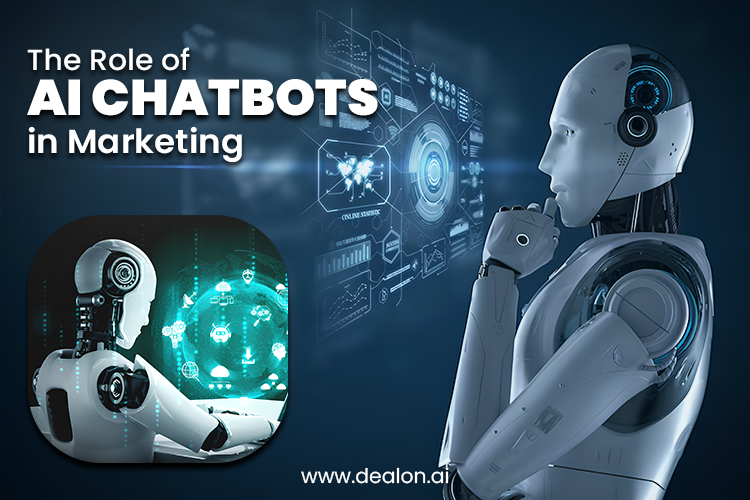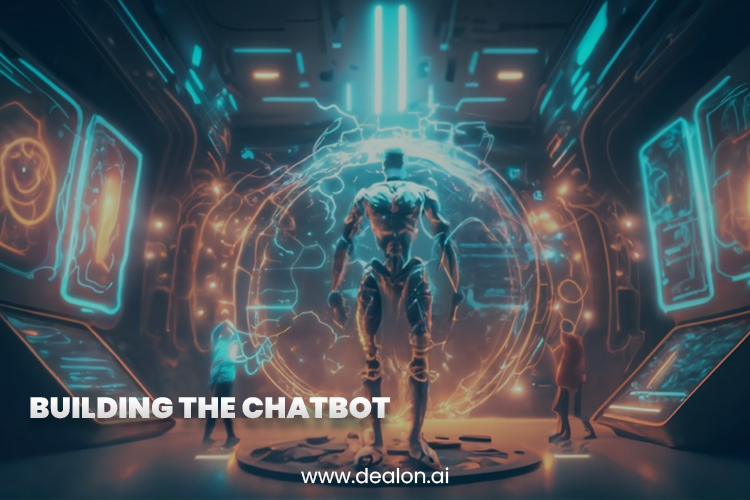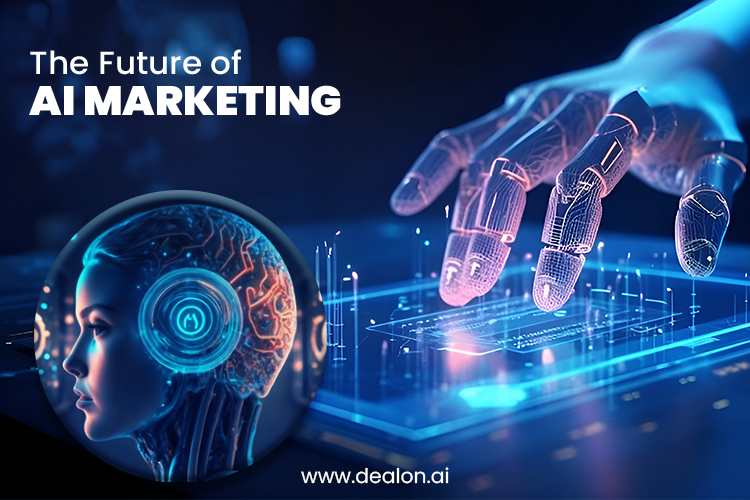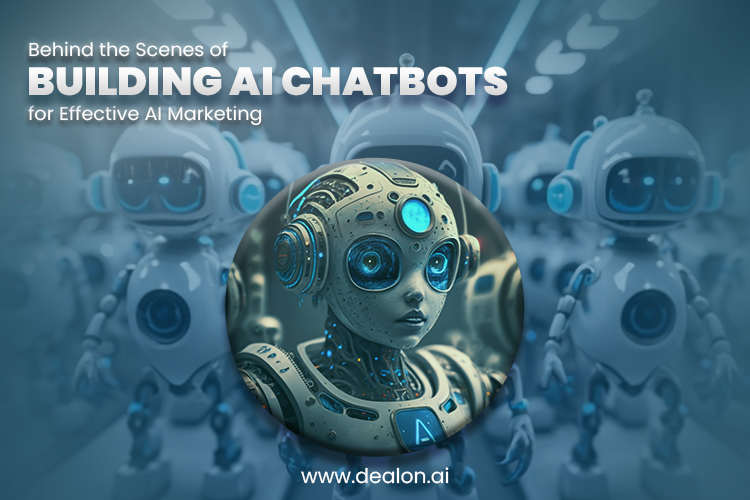Incorporating AI (artificial intelligence) has revolutionized how businesses interact with their audience within the constantly changing digital marketing terrain. AI chatbots and dynamic virtual assistants designed to enhance customer interactions and streamline marketing efforts are at the forefront of this revolution. In this exploration, we delve into the intricacies of building AI chatbots, unveiling the magic that powers their effectiveness in AI marketing. The term “AI marketing” has transcended buzzword status, becoming a strategic imperative for businesses seeking innovative ways to connect with their target audience.
At its core, AI marketing involves leveraging intelligent technologies to create personalized and efficient interactions, and AI chatbots stand as the vanguard of this paradigm shift. AI chatbots play a pivotal role in marketing strategies by offering a conversational experience beyond traditional methods. Capitalizing on their capacity to instantly comprehend and address user inquiries and strides in Natural Language Processing (NLP), enterprises can establish significant real-life connections with their clientele.
Building effective AI chatbots involves data, algorithms, and seamless integration. The process begins with robust data collection and analysis, providing the foundation for personalized interactions. Machine learning algorithms take center stage, enabling chatbots to evolve and adapt continuously based on user interactions. Incorporating Customer Relationship Management (CRM) systems guarantees that chatbots are equipped with up-to-date customer insights, providing personalized recommendations and experiences.
As we explore AI marketing, we will unravel the complexities behind the scenes of building AI chatbots. From understanding user behavior to integrating cutting-edge technologies, this journey promises to shed light on the magic that propels AI chatbots into the forefront of effective marketing strategies. Join us as we uncover the mechanisms that make AI chatbots a game-changer in the dynamic landscape of AI marketing.
The Role of AI Chatbots in Marketing

AI chatbots act as virtual assistants within the marketing landscape, assuming a multifaceted role beyond traditional customer engagement methods. In real-time, these intelligent bots interact with users, creating a dynamic and responsive channel for communication. Their functions extend beyond mere query resolution; AI chatbots are adept at initiating conversations and proactively engaging users based on predefined triggers or user behavior. The real-time engagement facilitated by AI chatbots is a cornerstone of their impact on marketing strategies. Unlike static web content or traditional customer service channels, chatbots provide an immediate and interactive experience.
Users can receive instant responses to their inquiries, fostering a sense of accessibility and responsiveness that aligns with the fast-paced nature of today’s digital landscape. The integration of AI chatbots into marketing strategies has proven revolutionary. By leveraging these intelligent bots, businesses can tailor their user interactions, offering a personalized experience that resonates with individual preferences and needs.
For instance, AI chatbots can analyze user data to understand past interactions, enabling them to provide customized recommendations or solutions. Moreover, the efficiency of AI chatbots in handling routine and repetitive tasks allows businesses to optimize their operations. These bots can simultaneously handle various queries, freeing human resources to concentrate on additional complex and strategic marketing and customer engagement aspects.
The conversational nature of AI chatbots also contributes to a more immersive user experience. Users experience a sense of interacting with an authentic individual, courtesy of advancements in Natural Language Processing (NLP) that empower chatbots to understand and respond in a way that emulates human conversation. This creates a more engaging and user-friendly interaction, fostering positive brand perceptions.
Fundamentally, the function of AI chatbots in marketing goes beyond traditional customer service, presenting businesses with a dynamic and personalized instrument to amplify user engagement, optimize operations, and enhance the overall customer experience. Integrating these intelligent bots has proven to be a game-changer, aligning marketing strategies with the evolving expectations of today’s tech-savvy and digitally connected consumers.
Crafting a Conversational Experience
- Building effective AI chatbots goes beyond mere functionality; it involves creating an immersive and human-like conversational experience. This process ensures users feel comfortable and engaged when interacting with the AI, enhancing the overall user experience. Implementing Natural Language Processing (NLP) algorithms is the key to achieving this.
- Understanding User Inputs: NLP algorithms are the backbone of a chatbot’s ability to comprehend and interpret user inputs. These sophisticated algorithms enable the chatbot to go beyond simple keyword recognition and understand the context, intent, and nuances of human language. For example, if a user asks a question using different words or phrases, NLP allows the chatbot to recognize the underlying meaning and respond appropriately.
- Contextual Awareness: Crafting a conversational experience requires more than just responding to individual queries. NLP algorithms enable chatbots to maintain contextual awareness throughout the conversation. The chatbot can recall and reference previous interactions, providing a more fluid and coherent dialogue. This contextual understanding allows for a more natural flow, similar to how humans maintain context in a conversation.
- Seamless and Intuitive Interaction: The goal is to create a seamless and intuitive interaction that feels natural to users. NLP ensures that the chatbot understands the words users input and grasps the implied meaning, sentiment, and even the user’s emotional state. This level of comprehension allows the chatbot to respond appropriately, adapting its tone and language to create a more personalized and relatable experience.
- Multi-Turn Conversations: Effective chatbots can engage in multi-turn conversations, where the interaction extends beyond a single question and answer. NLP algorithms enable the chatbot to navigate various topics coherently, making the conversation dynamic and fluid. This capability is essential for handling complex inquiries and providing comprehensive assistance.
- Continuous Learning and Improvement: Natural Language Processing (NLP) algorithms play a role in the ongoing learning and enhancement of the chatbot. As the chatbot interacts with users, it learns from each conversation, adapting its understanding and responses. This iterative learning process ensures that the chatbot becomes increasingly proficient in understanding diverse user inputs and delivering accurate and relevant information.
Building AI Chatbots

The behind-the-scenes process of building AI chatbots involves a meticulous approach to data, machine learning, CRM integration, and user interface design. This integration of technology and strategy ensures that AI chatbots meet user expectations and contribute significantly to the success of marketing campaigns through personalized, adaptive, and user-friendly interactions. Now, let us delve into the technical intricacies of crafting AI chatbots that function effectively and drive successful marketing campaigns.
Data Collection and Analysis
The entire architecture of an AI chatbot is built upon a data foundation. This entails the systematic gathering and examination of information related to users. This data encompasses many aspects, including user behavior, preferences, and pain points. User Understanding: Through data analysis, businesses gain insights into how users interact with the chatbot, what they seek, and their challenges.
This deep understanding forms the cornerstone for crafting personalized interactions tailored to resonate with the specific preferences of the target audience. By leveraging data, chatbots can deliver a customized experience. For instance, understanding a user’s past interactions allows the chatbot to recommend products or services based on their history, creating a more engaging and relevant interaction.
Machine Learning Algorithms
Machine Learning (ML) algorithms are the brains behind the evolving intelligence of AI chatbots. These algorithms empower chatbots to learn and adapt from each interaction. The iterative learning process enables them to refine their responses, enhancing their overall performance. ML algorithms ensure the chatbot remains adaptive as user needs and preferences change. Whether it’s understanding new industry trends or adapting to changes in user behavior, the chatbot’s ability to learn continuously ensures its relevance in dynamic marketing environments.
Integration with CRM Systems
Incorporating Customer Relationship Management (CRM) systems is essential strategically for AI chatbots. This integration provides chatbots access to a wealth of customer data, from past interactions to purchase history. Armed with CRM data, chatbots can offer tailored recommendations. For instance, if a user has previously shown interest in a particular product category, the chatbot can intelligently suggest related products, significantly enhancing the chances of conversion. Improved Customer Relationships: Chatbots contribute to building stronger customer relationships by seamlessly integrating with CRM systems. They can recall previous interactions, making each engagement feel more personalized and fostering a sense of continuity.
User-Friendly Interface
The user interface of an AI chatbot is a critical aspect of its success. It ought to be crafted with maximum intuitiveness, guaranteeing that users can navigate and engage with the chatbot effortlessly. The conversation flow should mimic natural human interaction. Through careful design and programming, the chatbot can respond in a way that feels conversational, fostering a more engaging and comfortable user experience. Whether embedded within a website or an app, the chatbot’s interface should seamlessly integrate with the user interface. This cohesive integration enhances user experience and encourages prolonged interactions.
The Future of AI Marketing

Looking toward the future of AI marketing, we anticipate substantial advancements that will redefine the capabilities of AI chatbots. One key area of progress lies in Natural Language Understanding (NLU), where we can expect a significant leap in accuracy and depth of comprehension. The next generation of AI chatbots will interpret user inputs more precisely and grasp contextual cues, nuances, and intent more sophisticatedly.
This implies a more human-like interaction, with the chatbot adapting to various languages seamlessly, broadening its reach on a global scale. Simultaneously, strides in sentiment analysis will equip AI chatbots with a heightened level of emotional intelligence. Chatbots can discern and respond to user emotions, tailoring their interactions based on their sentiments.
This shift towards emotional awareness could create more empathetic and personalized user experiences. Additionally, sentiment analysis can be leveraged proactively to identify users’ potential issues or concerns, allowing businesses to address them before they escalate. Integrating AI with emerging technologies is another pivotal aspect of the future landscape.
Augmented reality (AR) is positioned to influence considerably, envisioning AI chatbots delivering visual information or guidance through AR interfaces and crafting immersive and interactive experiences. Voice and visual search integration will make AI chatbots more versatile, enabling users to interact with them using voice commands or images. This diversification of interaction methods aims to facilitate a more intuitive user experience. Moreover, cross-platform integration will be a hallmark of future AI marketing.
AI chatbots will seamlessly transition between various platforms, including websites, social media, and messaging apps. This integration across multiple platforms guarantees a unified and cohesive brand image, providing users with a consistent experience, irrespective of their chosen engagement channel. The future of AI marketing represents a merging of progress in Natural Language Understanding (NLU), sentiment analysis, and the assimilation of emerging technologies.
Companies adopting these advancements are well-positioned to optimize the effectiveness of their marketing strategies, delivering unparalleled levels of personalization and engagement to their users. As AI and marketing synergize, the horizon is filled with possibilities for innovation, deeper connections, and a transformed customer interaction landscape.
Shaping tomorrow’s marketing landscape with AI
In exploring the intricacies behind building AI chatbots for effective marketing, we’ve journeyed through the foundational elements and cutting-edge advancements that propel these virtual assistants into the forefront of the digital era. From the fundamental role of data collection, machine learning algorithms, and CRM integration to crafting intuitive user interfaces, each aspect contributes to the dynamic synergy between AI and marketing. Looking forward, the future of AI marketing holds immense promise, with advancements in natural language understanding, sentiment analysis, and integration with emerging technologies reshaping the landscape.
NLU is set to bring about more accurate and context-aware interactions, while sentiment analysis will imbue AI chatbots with emotional intelligence, paving the way for empathetic user experiences. Integrating AI with technologies like Augmented Reality, voice, and visual search signifies a more versatile and immersive future. As AI seamlessly integrates across platforms, businesses embracing these innovations are positioned to optimize marketing efficiency and forge more profound, personalized connections with their audience. The journey into the future of AI marketing is marked by continuous evolution, innovation, and a commitment to enhancing user experiences in the ever-evolving digital realm.

